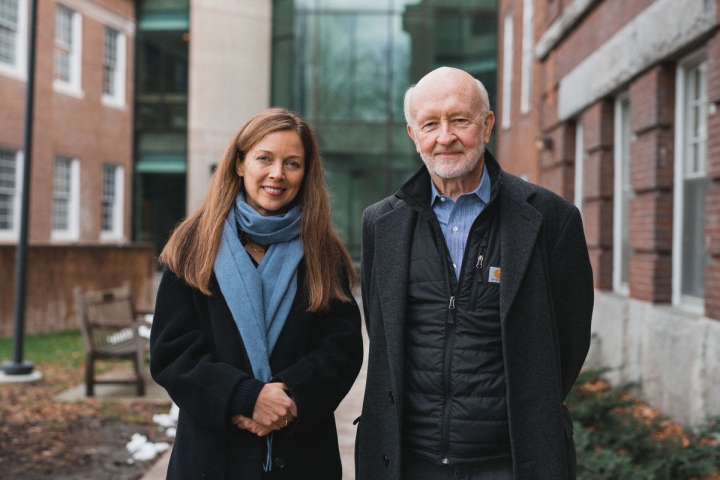Vaccine experts from academia, foundations, industry, and government will discuss global advances in vaccine research, development, and policy at the first annual Dartmouth International Vaccine Conference on Wednesday, Dec. 6.
The program will focus on vaccines for COVID-19, tuberculosis, respiratory syncytial virus, HIV, polio, and herpes.
Duane Compton, dean of the Geisel School of Medicine, will introduce the keynote speaker and Dartmouth President Sian Leah Beilock will deliver welcoming remarks at the all-day conference to be held on campus at the Hanover Inn.
Organized by the Dartmouth International Vaccine Initiative, the John Sloan Dickey Center for International Understanding, and Geisel, the program will also explore the role of academic vaccine institutes and critical issues in vaccine acceptance and vaccine access.
“The conference provides us with an opportunity to highlight Dartmouth’s legacy in vaccine research, which dates back to the development of the measles vaccine by Samuel Katz ’48, Geisel ’50, and focus on new vaccines for the world,” says conference co-chair and afternoon session moderator Ford von Reyn ’67, Geisel ’69, an infectious disease specialist and a professor of medicine at Geisel who led the development of the Dartmouth TB vaccine, DAR-901.
Licensed in 1963, the measles vaccine has saved millions of lives.
John Modlin, professor emeritus and former chair of the Department of Pediatrics at Geisel and Dartmouth Hitchcock Medical Center, will discuss Katz’s research and the measles vaccine. Modlin recently received the 2023 D.A. Henderson Award for Outstanding Contributions to Public Health for his work in advancing vaccine safety and public policy.
Structural biologist and former Geisel assistant professor Jason McLellan, now a professor of molecular sciences and the Robert A. Welch Chair in Chemistry at the University of Texas at Austin, will deliver the keynote address. He will discuss COVID-19 vaccines and the structural basis of immunogenicity, which refers to the ability of cells and tissues to provoke an immune response.
McLellan is credited with inventing, during his time at Dartmouth, a method to stabilize coronavirus spike proteins—a technology that is the basis for messenger ribonucleic acid vaccines that protect people from COVID-19. Unlike most vaccines which contain an actual virus or deadened bacteria, mRNA vaccines produce viral proteins resembling the protein spikes that trigger the immune system by producing antibodies, which remain in the system after exposure. More than 5.5 billion people worldwide have received at least one COVID-19 dose, many of which rely on spike protein technology.
Earlier this year, Dartmouth’s vaccine breakthrough on stabilizing coronavirus spike proteins led by McLellan earned a Patents for Humanity award from the U.S. Patent and Trademark Office in the COVID-19 category. McLellan was also recognized for this work in 2022 when he received Dartmouth’s inaugural McGuire Family Prize for Societal Impact.
“One of our objectives with this conference is to highlight how the social sciences can be applied to vaccine development upstream in ways that help ensure vaccines become vaccinations,” says conference co-chair and morning session moderator Kendall Hoyt, faculty director for the Dickey Global Health Initiative’s Pandemic Security Project, and an assistant professor of medicine at Geisel. “We will also focus on mechanisms to improve vaccine access and strategies to reduce hesitancy barriers.”
Speakers will include other faculty members at Geisel, Thayer School of Engineering, and Tuck School of Business, and from the Arts and Sciences at Dartmouth. Brendan Nyhan, the James O. Freedman Presidential Professor of Government, will speak on vaccine misinformation and politicization.
Claire Wagner ’10, head of corporate strategy at Bill & Melinda Gates Medical Research Institute and a former intern at the Dickey Center’s Global Health Initiative, will discuss TB vaccines and the role of nongovernmental organizations.
Philip Dormitzer, senior vice president and global head of vaccines research and development at GSK, will discuss the role of industry in vaccine development.
Mark Connors, chief of the HIV-specific immunity section at the National Institutes of Health, will discuss HIV vaccines and the role of NIH.
Associate Dean for Global Health Lisa Adams, Geisel ’90, director of global initiatives in the Office of the Provost at Dartmouth, director of the Center for Health Equity, and a professor of medicine at Geisel, will serve as a panelist in the afternoon panel discussion.
The program will close with remarks by von Reyn regarding a vision for a Dartmouth International Vaccine Institute, an interdisciplinary initiative on vaccine research by faculty from throughout Dartmouth and its professional schools.
The conference is open to the public, and the registration fee is waived for all Dartmouth students. Pre-registration is required to attend. Continuing education credit is available. For the schedule, complete list of speakers, and to register, please visit the conference’s website.
In addition to Geisel and the Dickey Center, the conference is sponsored by the Jack and Dorothy Byrne Foundation, the Department of Microbiology and Immunology at Geisel, the Center for Health Equity, the Dartmouth Health Section of Infectious Disease and International Health, the Center for Health Care at Tuck, and the Dartmouth Health Department of Pediatrics.
